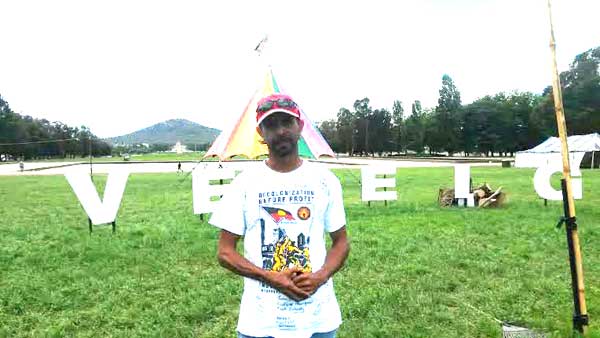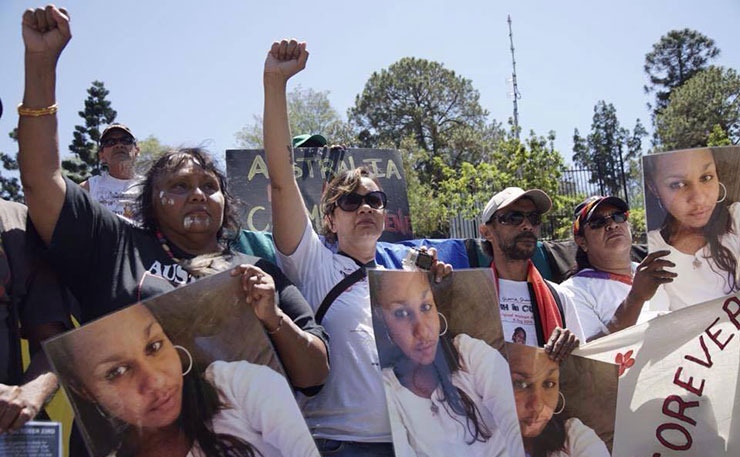On this day last year, a 22-year-old Yamitji woman died in custody after being jailed in South Hedland for $1,000 in unpaid fines. She had committed no crime.
Twice in the lead up to her death the young woman was transported to South Hedland Health Campus in a police car, not an ambulance, but was sent back both times. On the third occasion she passed away, and in the process became a number – the 339th Aboriginal death in custody in the two decades since a Royal Commission delivered the same number of recommendations, 339, the vast majority of them never implemented.
Now we have more deaths than recommendations.
The details of her death are still limited to only a few sentences. Her family have not received her medical reports and her dying hours are vague, as the long wait continues for a coronial inquest, to be held in November. The family have watched time flow, bringing them closer to a small chance of simply knowing.
This young woman, though, was more than a number. Her name was Julieka Dhu, described as ‘beautiful’ and ‘happy’ and a person who everyone liked.
“She was one of those people it would be very hard to find an enemy…. She was like a mother to all her little nieces and nephews, her little sisters,” her Uncle Shaun Harris told 98.9 fm’s Let’s Talk programme last week, in the lead up to the anniversary.
“It’s just a shock to us all still, that she’s still not here.”
Today, her family are commemorating her death with a national display of action in her hometown of Geraldton, as well as South Hedland, the place where she died, and in Perth, Sydney, Melbourne and Brisbane.
Julieka’s death, and her family’s fight for justice, is not a lone fight.
In the year since, there have been at least two more black deaths in custody – a Noongar man who died in a Perth prison about two months after Julieka and, earlier this year, an Aboriginal man who died within three hours of being picked up off a Darwin street for a minor alcohol offence, after being targeted under the NT’s controversial paperless arrest laws.
In 2012 an Aboriginal woman died a day after being incarcerated in Broome. Despite the three years that have passed, the family of Maureen Mandijarra are still waiting on a coronial inquest. The reason? The WA Police have yet to hand the investigation report to the Coroner. The WA Coroner’s Office told New Matilda the matter is “progressing as quickly as possible” but “it is not currently possible to indicate when an inquest is likely to be held”.
Julieka’s family will not have to wait that long. There will be an inquest in November.
But would it have happened as quickly if they hadn’t put pressure on the WA government, and campaigned relentlessly over the past year for justice, or would they still be waiting like Ms Mandijarra’s family?
Mr Harris doesn’t think the outcomes would have been different if not for the family’s campaign. He says they have had to utilise non-traditional media in order to keep Julieka’s case in the spotlight.
“We had to rely massively on social media, because the mainstream media yet again fails us black people of Australia on the really important black issues.
“And these aren’t just black issues, but Australian issues as well…. We can’t keep being pushed aside or shoved under the carpet. They have to stop being in denial about how they’re treating us, how they’re murdering us.”
Their campaign, which saw Mr Harris travel across the country to drum up support, resulted in an apology from WA Premier Colin Barnett, who promised to find “the truth”, and also committed to “personally take on, to work with ministers to try and reduce the number of Aboriginal people in jail systems and reduce the sort of tragedies that you’re talking about”.
Mr Barnett also attended a meeting with members of Ms Dhu’s family in South Hedland, where her family visited the cell in which she died.
But the Premier’s promise came in the midst of his government’s proposals to close down up to 150 remote Aboriginal communities, which would push Aboriginal people off their homelands and into larger centres, and its proposed bill to toughen mandatory sentencing for home burglaries.
WA is the only state in the country that has mandatory sentencing for juveniles, for which it has been condemned internationally. Controversially, there is a mandatory minimum sentence of 12 months detention or imprisonment for youth who have been convicted of a ‘three strike’ home burglary, meaning they have two prior convictions for home burglary.
The new laws would toughen this, and Amnesty International predicts they will tie the hands of magistrates and lead to higher Aboriginal juvenile detention rates. The state currently jails Aboriginal youth at some of the highest rates in the country.
The Premier’s promises to Julieka are nothing but “lip service” if you take into account these policies, according to Mr Harris.
University of Technology Sydney (UTS) and Yuin academic Amanda Porter agrees.
“There’s a clear internal inconsistency here. Western Australia has the worst reputation in the nation for incarcerating Aboriginal people,” Dr Porter told 98.9 fm.

“Barnett is saying, oh yes ‘I’m sorry for your loss’, but in the meantime, he is passing the home burglary bill which introduces three strikes and you’re out mandatory detention for home burglary.
“It’s rhetoric that is inconsistent with the policies he’s implementing.”
It was a sentiment picked up by Labor MP John Quigley during debates on the home burglary bill earlier this year, with the MP labelling Barnett the “hypocrite supreme” for being “dishonest” in saying judges would take into consideration Aboriginal children with Foetal Alcohol Syndrome in mandatory sentencing.
“The Premier himself stands on the steps of this Parliament after the tragic death… of Julieka Dhu, who was in there on a warrant for which a white person would not have been in prison. It was for unpaid fines; a white person in those circumstances would not have been in prison. Let us get this right,” Mr Quigley said.
“It is scandalous for the Premier to stand on the steps of this Parliament and say that he will take personal responsibility, and then have the gall to attack the judiciary and say that everyone knows that judges are not doing the right thing… and then to accelerate the rate at which Indigenous are incarcerated.”
Mr Harris says if the Barnett government was serious about reforming the system, the first thing it would do would be to introduce a Custody Notification Service (CNS), a recommendation of the Royal Commission. The only state that has a CNS is New South Wales, which legislated for one, but even then it has been constantly endangered by the threat of funding cuts.
Mr Harris believes Julieka would still be alive if a CNS was in operation. But despite the family mentioning it to Mr Barnett as late as the South Hedland meeting, there is still no movement.
“As far as I’ve heard, there’s no money allocated from the budget. He has had a year not to deliver on these broken lies and promises,” Mr Harris says.
“Why not use the template for the NSW Custody Notification Service and get it rushed through straight away instead of meeting up with people to figure it out. It would save a hell of a lot of time, and a hell of a lot of life. People are still dying, it’s not just in WA, and that notification service needed to be implemented and expanded yesterday.”
The CNS is not the only recommendation of the Royal Commission that wasn’t implemented. Dr Porter says that it is frustrating, and that the numbers of deaths in custody remain high because governments “implement policies that are inconsistent with the recommendations”.
The tragedy is that Julieka’s death is similar to Aboriginal women who died in custody in the 80s, some of whom had been locked up for unpaid fines.
“What saddens me in particular, having read the Royal Commission, the five volumes and the 99 (individual death) reports, is if you look at those 99 individual reports, of those that are women, a lot of them have so many parallels with Julieka Dhu’s case,” Dr Porter told 98.9 fm.
“These were reports that were written in the 1980s, and that adds a whole other dimension of tragedy.
“The numbers have increased since the Royal Commission and it’s something I struggle to understand as a researcher. There has been a major royal commission that’s been given 339 clear recommendations on how to avoid Aboriginal deaths in custody, and I’d go as far as saying that any other royal commission conducted in Australia would not be met with this kind of negligent response.”
As we continue to wait for Julieka’s inquest the definition of ‘justice’ becomes vague.
There has never been a conviction over an Aboriginal death in custody – in fact, there has only ever been two cases in which police officers were charged, once over the 1983 death in custody of Roebourne boy John Pat, the other over the 2004 killing of Mulrunji Doomadgee on Palm Island.
There is no accountability, and no transparency. There are very few forms of legal redress for families of death in custody victims.
“There have been civil trials, for negligence, I’m looking at Mr Ward’s case… which is a clear example of negligence at a government departmental level, the lack of duty of care displayed to him and his wellbeing. And I would say the same for Julieka Dhu,” Dr Porter said.
“It was a really bad policy and I see it as criminal negligence, but the legal system won’t recognise that. There is really limited redress within the conventional system.”
For Mr Harris, the family are happy for the inquest, for a small shot at knowing. Justice means accountability, he believes.
“We won’t know the truth until the inquest is over,” he says.
But as we commemorate the one-year anniversary of Julieka’s death, the cries of those who never received justice cast a sad shadow over the future.
“There is no justice for Aboriginal people under the criminal justice system,” Dr Porter says.
“This is not a system of law that prides itself on equality. It is three systems of law – white justice, black justice and blue justice.”
Donate To New Matilda
New Matilda is a small, independent media outlet. We survive through reader contributions, and never losing a lawsuit. If you got something from this article, giving something back helps us to continue speaking truth to power. Every little bit counts.




